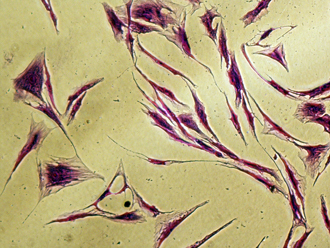Fat Cells May Fight Cancer
Most Americans bemoan an excess of fat. But how cool would it be if one day doctors could use fat cells to fight cancer? Tulane urology professor Asim Abdel-Mageed is examining the ability of stem cells from the fat tissue of prostate cancer patients to migrate to and enhance the growth of prostate tumors.

Color-stained stem cells derived from the fat tissue of a prostate cancer patient may be genetically engineered to act as the “Trojan horse” to fight the cancer cells' growth. (Photo from Asim Abdel-Mageed)
He is exploring a possible link between obesity and prostate cancer development and progression. The results of his research may provide new options for prostate cancer patients and potentially lead to adjuvant therapies to enhance the effectiveness of conventional treatment.
Abdel-Mageed's team proposes to genetically engineer the fat cells and use them as a vehicle to deliver an enzyme that degrades locally produced hormones that encourage prostate cancer to grow.
“We will use them as a Trojan horse, so to speak, to specifically target metastatic tumor cells at their sanctuary sites,” says Abdel-Mageed.
The incidence and mortality of prostate cancer is twice as high among African American men as Caucasians and other ethnic minorities, says Abdel-Mageed, who is principal investigator on a nearly $1 million Department of Defense Health Disparity Research grant supporting this project.
“Obesity is a risk factor for prostate cancer, especially among African Americans. We wanted to explore its possible role in the disproportionate prostate cancer incidence and progression in this group.”
Abdel-Mageed teamed up with Dr. Raju Thomas, chair of urology and a prostate cancer surgeon, to acquire fat tissue from prostate cancer patients undergoing surgery at Tulane.
“We focused on adipose-derived stem cells, or ADSCs, as there was emerging evidence to suggest that these cells have higher ability to migrate toward cancer cells,” says Abdel-Mageed. His team isolated the African American and Caucasian stem cell populations in the laboratory and then tested their ability to migrate toward prostate tumor cells.
“Compared to Caucasians and cancer-free subjects, we found that ADSCs from African American men not only have higher propensity to migrate to tumors but also to enhance the growth of prostate cancer cells.”
Melanie Cross is manager of communications at the Tulane Cancer Center.
